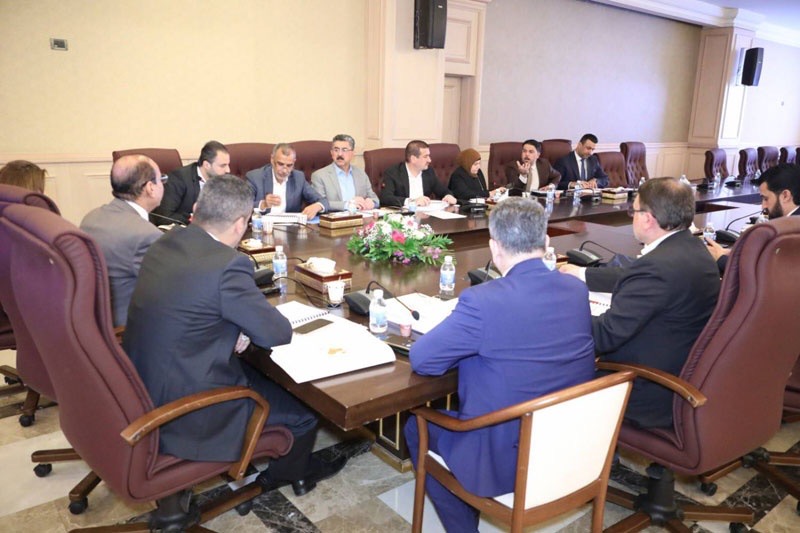Political calculations obstruct approving the federal budget in Iraq
Political calculations obstruct approving the federal budget in Iraq
5-17-2023
 Iraqi parliamentary circles rule out the possibility of approving the general budget this week, in light of the ongoing disputes between the political blocs over many items, including those related to the shares of the provinces and ministries.
Iraqi parliamentary circles rule out the possibility of approving the general budget this week, in light of the ongoing disputes between the political blocs over many items, including those related to the shares of the provinces and ministries.
The circles say that each political party deals with the general budget that concerns the current year and the years 2024 and 2025 with a logic that is not devoid of its own political sensitivities, in relation to the next electoral bet, which causes delays in agreeing on it.
On the thirteenth of last March, the Iraqi Council of Ministers approved the largest financial budget in the country’s history, exceeding 197 trillion and 828 billion Iraqi dinars (about 152.2 billion dollars), with a total deficit estimated at 63 trillion Iraqi dinars.
However, the parliamentary circles exclude the possibility of adhering to this date, pointing out that the closest option is a partial vote on the budget, and the postponement of controversial points until a later time in order to allow room for agreement on it.
Representative Mustafa Al-Karawi stated, “Until this hour, the Parliamentary Finance Committee continues to discuss the paragraphs of the budget law, and there are many parliamentary observations on the paragraphs, especially related to financial allocations for the governorates and some ministries, and we need time to reach an agreement on those paragraphs.”
Al-Karawi said, in statements to local media, that “there are reservations among some parliamentary blocs and deputies about the budget law, and there is almost confirmation and consensus on the need to make fundamental amendments to the paragraphs of the law, before passing it, and without that it is very difficult to pass the law, and for this we will work to make transfers in allocations.” Finance for the fairness of the provinces.
He pointed out that “the House of Representatives can start voting on some paragraphs of the budget law, which do not have any disagreement or reservations, and to postpone the controversial paragraphs until next week.”
And Al-Karawi considered, “Passing the entire law during the current week, we believe that it is not easy, and it requires parliamentary consensus, and this consensus does not exist until now, unless the necessary amendments to the law are made.”
Representatives from central and southern Iraq announced their refusal to ratify the budget in its current form, calling for a review of the financial allocations directed to their provinces.
Observers believe that the positions of some deputies and blocs seem to be greatly affected by the local elections that will take place next November, as these blocs seek to collect gains for the governorates that they dominate and have popular bases in, which explains the pressure related to this paragraph.
In the event that appropriate funds are not allocated to the governorate, they will refrain from participating in the voting session on the general budget.” On Sunday, the Parliamentary Services and Reconstruction Committee hosted the governors in a meeting devoted to discussing the budget.
The committee stated in a statement that “its members listened during the meeting to the needs of the governorates with regard to the priority of projects and the distribution of financial allocations fairly between the governorates for all service sectors in the field of energy, health, education, housing, water, sewage, roads and bridges, as well as the need to develop solutions to the financial obstacles of lagging projects and promote the principle of Administrative decentralization and strengthening its financial allocations.
The statement indicated that “the Parliamentary Services and Reconstruction Committee is in the process of submitting a report on the governorates’ projects to the Finance Committee to take them into consideration and study to include them in the budget.”
Iraqi Prime Minister Muhammad Shia al-Sudani is looking forward to approving the general budget, in order to ensure a relatively stable government mandate. Observers say that the coordination framework, which is the political party currently controlling the Iraqi scene, will be keen to pass this budget, despite the large gaps it contains, which financial experts have previously warned about, especially in relation to the deficit ratio.
During the year 2022, Iraq remained without a general budget, due to the political crisis it witnessed following the legislative elections. The previous caretaker government, which was headed by Mustafa Al-Kazemi, tried to send a budget, but failed to do so, by a decision of the Federal Supreme Court.
The financial situation is currently managed in accordance with Article 13 first of the Financial Management Law No. 6 of 2019, which states that “in the event of delay in approving the federal general budget, the Minister of Finance issues directives to spend on operating expenses,” most notably the salaries of employees that exceed six billion dollars per month.
rawabetcenter.com
